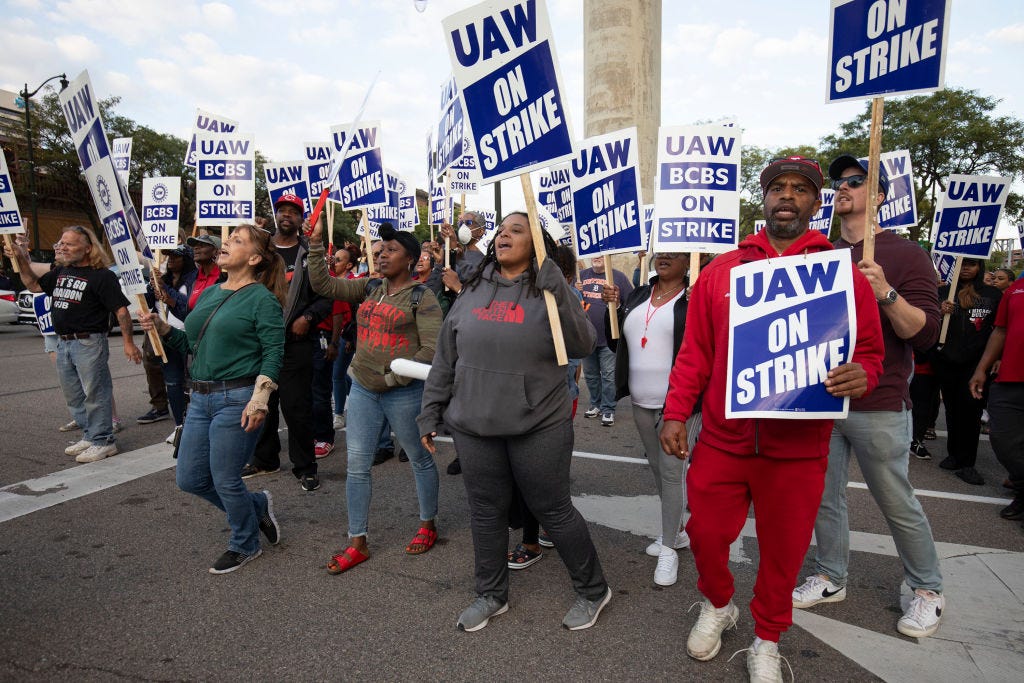Stop moping. Start organizing
Organizer Astra Taylor talks about why everyone misunderstands identity politics, how Republicans dominated the media, and why organizing is still the key to change
As part of the series of conversations we’re having to explore how the Democratic defeat has challenged people’s preconceptions about American politics and to gather thoughts on how to plan for the future, we had a lengthy, wide-ranging discussion with Astra Taylor — organizer, author, debt-relief activist, and insightful analyst of political culture. Faced with the challenge of organizing under a second Trump administration, Taylor shared with us her perspective on what led to Harris’s loss, and the prospects for effective action that could lead to change come 2028, and lasting change beyond.
In the second part of our interview, Taylor talks to us about what progressives can learn from the Republican campaign’s media strategy, how Democrats and the media misunderstood both Republican messaging and the very notion of “identity politics,” and how progressives can begin to build the organizational and informational infrastructure to make future victories possible.
Catch up with the first half of our interview with Astra Taylor at the link below:
We hope The Ink will be essential to the thinking and reimagining and reckoning and doing that all lie ahead. We want to thank you for being a part of what we are and what we do, and we promise you that this community is going to find every way possible to be there for you in the times that lie ahead and be there for this country and for what it can be still.
We were talking earlier about the very different way Republicans approached the ground game in this election. Republicans were very good at leveraging culture in a way that the Democrats just missed out on. They tried. The Harris campaign did a bunch of TikToks. Walz and AOC did those gaming streams. And then they had this endless parade of celebrities kind of like putting their stamp of approval on Harris. But on the other side, you had a successful campaign to do authentic cultural outreach, to be on podcasts, to hang out with influencers. That just fell completely flat on the Democratic side. Why do you think that is?
I do want to say that I think the Republicans are swimming downstream in culture. I mean, when they're embracing — I don't even want to say men's rights — but this masculinist macho narrative, right, that we live in a patriarchal society. They're going with the grain of they're going with the grain of deep societal orientations and trends. And so I think the kind of cultural work Democrats need to do to combat that, again, also needs to be thought about on a really long time scale.
I mean, I think the celebrity stuff was interesting. I see why they trotted them out, but then it's also so condescending. But that doesn't mean that you're looking to Beyonce for political advice, right? It's not like she has cultivated an audience that is spreading her political message, right? I think that was a weakness.
A lot of what passes for the liberal media, unfortunately, is kind of trapped in similar class dynamics to the party writ large. It's interesting to see The New York Times suddenly publish a barrage of pieces about how we need to be a bit less about identity politics and put the working class first, but come on. If there was a real whiff of economic populism in the air, they’d be about as enthusiastic as they were when Bernie Sanders had a chance at taking the primary nomination.
I was talking to another person who does Latino outreach in Texas, and they were saying that the Democratic Party establishment has no clue where people are actually getting their media from.
They have no feel for it, no shorthand for it.
And so we need to investigate where the media centers are that reach these different demographics. How can they be engaged? And also, I think it's not just about the channels, it's about the message. And I think in contrast to shallow interest group coalition building, we need a message of real solidarity. Demonstrate why people need to stand up for each other. Talk about who the real folks profiting from our division are and the fact that we're fighting for scraps? That message can resonate with different demographics. But you have to figure out the channels through which you can actually reach those folks.
What does it look like to build the channels we need to reach people? You’re involved in a lot of stuff. You're a filmmaker, you're a musician. You play in the culture.






